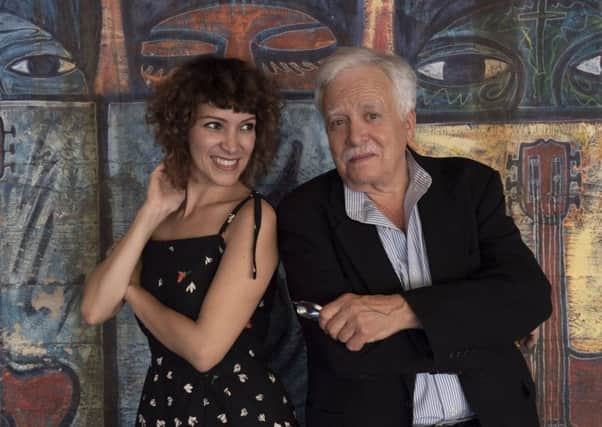Album reviews: Gaby Moreno & Van Dyke Parks | Judy Soundtrack | The Darkness


Gaby Moreno & Van Dyke Parks: ¡Spangled! (Nonesuch) ****
Various: Judy (Decca) ****
The Darkness: Easter Is Cancelled (Cooking Vinyl) ***
The musical stars have aligned in the collaboration of LA-based Guatemalan singer Gaby Moreno and Beach Boys/Brian Wilson’s right hand arranger Van Dyke Parks. ¡Spangled! showcases the magnificent Moreno channelling Linda Ronstadt in her Latino rapture over Parks’ twinkling orchestral arrangements to create a glorious symphonic suite of classic songs from across the Americas.
Advertisement
Hide AdAdvertisement
Hide AdMoreno has form with such pan-American fare, having worked with cosmic country band Calexico on a concert of border songs. There is probably never a bad time to celebrate the time-honoured tradition of human migration but a couple of these numbers feel especially piquant today.
Ry Cooder, another great chronicler of the Chicano experience, guests on an exquisite rendition of Across the Borderline, which he co-wrote in 1982 with John Hiatt and Jim Dickinson. His unmistakeable guitar work is further complemented by guest vocals from Jackson Browne on this bittersweet border ballad, cautioning that the grass is not always greener in the “broken promised land.”
David Rudder’s The Immigrants is a more defiant celebration of the immigrant foundations on which the US is built (“we all came here to take the plunge”) but beyond the obvious political resonances, ¡Spangled! is a loving salute to the timeless potency and emotion of Latin song, stretching back more than a hundred years to the trilling poetry of Alma Llanera, Venezuela’s unofficial national anthem, before moving up to date with Moreno’s own dramatic tribute to a hypnotic travelling troubadour, El Sombrerón.
The rest of the collection encompasses the ravishing Panamanian waltz ballad Historia de un Amor, the adoration of the Puerto Rican lament Esperame en el Cielo (Wait for Me in Heaven) and the girlish sashay of Peruvian song Nube Gris, which belies a darker lyric about holding someone back. On the contrary, it is impossible not to be swept along by this life-affirming album.
There is further escapist delight to be had in Judy, the soundtrack to the new Judy Garland biopic, which stars Renée Zellweger whooping up a storm in the title role as the older, weathered Garland. Judging by the soundtrack evidence, the all-singing, all-dancing Zellweger captures her zest and her sensitivity rather than trying to imitate the inimitable.
She duets with Sam Smith on a buoyant Get Happy (Michael Bublé must have been busy), while Rufus Wainwright turns in an overly hammy rendition of the Yuletide yearning of Have Yourself A Merry Little Christmas. Zellweger doesn’t really need those guys – she is all over the showstopping For Once In My Life, a jubilant Trolley Song and the mature melodrama of The Man That Got Away.
The orchestration is also spot-on with the Latin big band pzazz of Talk of the Town sustained through a dramatic, hectic and snake-hipped Rain or Shine.
Advertisement
Hide AdAdvertisement
Hide AdRetro rockers The Darkness are serious in their silliness, pulling off the heavy rock bombast that time clearly didn’t forget. They have declared their latest spandexed outing, Easter Is Cancelled, to be “the grandest statement any band has ever made” and proclaim the death of the genre they so valiantly uphold on opening track, Rock and Roll Deserves to Die, with five minutes’ OTT wailing before loping off into the sunset.
Frontman Justin Hawkins prepares for the rock opera of his life with the arguably autobiographical Live Till I Die telling of a lowly upbringing and unhappy schooldays. But the kitchen sink goes out the window on the likes of Deck Chair, an existential torch song about having nowhere to sit, the bonkers glam rocker Heavy Metal Lover and the heroic heads-down boogie, soaring pomp rock and traditional heavy metal riffola which they cram into the title track. Fiona Shepherd
CLASSICAL
Palestrina Vol 8: The Sixteen (Coro) *****
Is it ever possible to tire of the mellifluous, melting strands of counterpoint that immediately identify Palestrina’s a cappella masses and motets as the golden epitome of Italian Renaissance church music? Not when sung with such nuanced precision as Harry Christophers’ The Sixteen, whose eighth recording in this ongoing survey of the composer is yet another breathtaking example of choral singing that respects the natural, self-generating purity of the compositional architecture, yet adds tasteful colour and vibrant nuance on a plurality of levels.
Around the centrally positioned Missa Fratres ego enim accepi – helpfully preceded by the eponymous motet that is its nuclear inspiration – are a selection of shorter works representative of the Blessed Sacrament, from the Corpus Christi motet Ego sum panis vivus and
blissful Caro mea vere est cibus, to the delights of Palestrina’s Song of Songs settings. Ken Walton
JAZZ
Dave Holland Zakir Hussain Chris Potter: Good Hope (Edition Records) ****
Now calling themselves the Crosscurrents Trio, this “supergroup” of Indian tabla star Zakir Hussain, US-based English double-bassist Dave Holland and US saxophonist Chris Potter played a blinder of a gig at last year’s Edinburgh Jazz Festival. This debut studio recording may not quite release the spark of their live performance, but it still captures all the virtuosity and creative empathy of three master musicians.
Advertisement
Hide AdAdvertisement
Hide AdFrom the easefully swaying melody of the opening Ziandi to the animated dialogues between soprano sax and bass in Lucky Seven, Holland and Potter are borne along by the incessant flow of Hussain’s tablas, whether rattling and thwacking, stealthily measured or working up a frenetic whirr. Moments to relish include Holland’s bass introduction to Suvarna, and the progress of the closing Mazad, with its marimba-like percussion intro leading on to a lissom melody on soprano sax. Jim Gilchrist